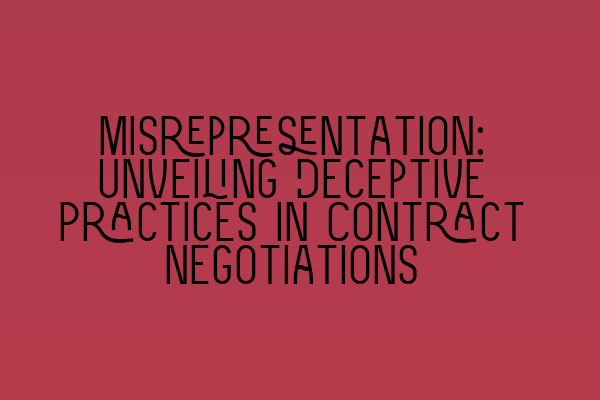Misrepresentation: Unveiling Deceptive Practices in Contract Negotiations
In the world of contract law, negotiations lie at the heart of establishing agreements between two or more parties. When entering into a contract, it is crucial for all parties involved to provide accurate and truthful information to ensure a fair and equitable arrangement. However, in some instances, deceptive practices can arise, leading to misrepresentation and potential legal consequences.
Misrepresentation occurs when one party makes a false statement or conceals important information that influences the decision-making process of the other party. It undermines the trust and fairness essential to contract negotiations and can have significant implications for both parties involved.
To better understand the complexities of misrepresentation, let’s delve into its various forms and explore the legal ramifications that follow.
Forms of Misrepresentation
1. Innocent Misrepresentation:
Innocent misrepresentation occurs when a party makes a false statement or conceals material facts without any intention to deceive. This form of misrepresentation is unintentional, but it still carries legal consequences. The misled party may be entitled to seek remedies such as rescission, damages, or rectification to address the unfairness caused by innocent misrepresentation.
2. Negligent Misrepresentation:
Negligent misrepresentation involves the making of false statements or the concealment of material facts due to a lack of reasonable care or competence. Unlike innocent misrepresentation, negligent misrepresentation occurs when the party asserting the statement fails to take reasonable steps to ensure its accuracy. In such cases, the misled party may have the right to claim damages to rectify any losses suffered as a result of the misrepresentation.
3. Fraudulent Misrepresentation:
Fraudulent misrepresentation occurs when a party knowingly makes false statements or conceals material facts with the intention to deceive and induce the other party into entering the contract. Fraudulent misrepresentation is a serious offense and can lead to severe legal consequences. The misled party may seek damages or choose to rescind the contract based on the fraudulent misrepresentation.
Legal Consequences of Misrepresentation
When misrepresentation occurs, the misled party has several legal remedies available to address the unfairness caused by the deceitful practices. These remedies aim to restore the parties to their original positions before entering into the contract or to compensate for any losses suffered.
1. Rescission:
Rescission allows the misled party to set aside the contract and return to their pre-contractual position. Rescission may be available in cases of innocent misrepresentation, negligent misrepresentation, or fraudulent misrepresentation. However, certain factors, such as time limitations and the availability of third-party rights, may impact the effectiveness of rescission as a remedy.
2. Damages:
Damages are a common remedy sought in cases of misrepresentation. The party that suffered losses due to the misrepresentation may be entitled to claim damages to compensate for the financial harm suffered. The amount of damages awarded depends on the nature and extent of the losses incurred.
3. Rectification:
Rectification is a remedy that aims to correct the terms of the contract to reflect the original intentions of the parties involved. It is typically sought when there is a discrepancy between the agreed-upon terms and the terms documented in the written contract. Rectification allows the contract to accurately represent the true agreement between the parties.
Avoiding Misrepresentation in Contract Negotiations
Preventing misrepresentation is essential to maintain trust and fairness in contract negotiations. Here are some practical steps you can take to avoid misrepresentation:
1. Honesty and Transparency:
Provide honest and accurate information during negotiations. Disclose all material facts that may influence the other party’s decision. Transparent communication builds trust and reduces the risk of misrepresentation.
2. Written Documentation:
Record all negotiations and agreements in writing. A written contract helps to ensure clarity and reduces the likelihood of misunderstandings or misrepresentation.
3. Legal Advice:
Consulting a solicitor experienced in contract law can provide valuable guidance during negotiations. A solicitor can help navigate complex legal issues, provide advice on contractual terms, and ensure compliance with relevant laws and regulations.
Conclusion
Misrepresentation is a serious offense that disrupts the fairness and integrity of contract negotiations. Understanding the various forms of misrepresentation and the available legal remedies is crucial for both parties involved in a contract. By practicing honesty, transparency, and seeking legal advice when needed, parties can mitigate the risk of misrepresentation and establish contracts built on trust and fairness.
For more information on navigating the legal complexities of contract law and becoming a solicitor, check out the following related articles:
– Securing Training Contracts: A Roadmap to Becoming a Solicitor
– Mentorship for Aspiring Solicitors: Nurturing Talent in the Legal Field
– Legal Challenges and Pitfalls: Navigating the Complexities of the Legal System
– The GDL (Graduate Diploma in Law): A Pathway to Becoming a Solicitor
– Mastering the Solicitor’s Path: Prepare for the Journey Ahead
Remember, preventing misrepresentation is not only a legal obligation but also an ethical responsibility. By upholding integrity in contract negotiations, you contribute to a fair and just legal system.
